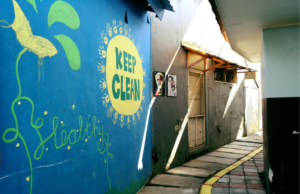Check out the online version and subscribe here to get the next digest.
Dear MIT GOV/LAB Community,
Over the past year, we’ve gradually and carefully begun to emerge from our pandemic bubbles — we’ve met face-to-face with team members and partners, traveled, and returned to projects that are less closely connected to Covid-19.
But the pandemic has taught us some vital lessons about collaborating with and supporting partners working to promote citizen engagement and government response. Periods of crisis have highlighted the importance of building trust: both between citizens and authorities, as well as between academics and practitioners at the start of new partnerships. These stronger relationships allow us to be more adaptable and flexible.
We wanted to highlight the progress we’ve made in three areas of work over the last year and share where these initiatives are headed next.

Meeting with Dr. Jumoke Oduwole and the Presidential Enabling Business Environment Council (PEBEC) team in Abuja, Nigeria. Credits: PEBEC.
Developing our Lean Governance Innovation Design Approach
Our approach to governance innovation involves working with practitioner partners to identify governance challenges and develop solutions to those challenges by applying evidence and methods from design and social science. In the next phase of our initiative, we’re embedding two designer-researchers, with our governance innovation approach, within government teams working on governance innovation in Nigeria and Sierra Leone.
We also kicked off our “Meet the Governance Innovators” discussion speaker series with two sessions this spring. Leaders at the forefront of innovative solutions in public service and designers shared thoughts on the challenges and opportunities they face when innovating in the public sector.
Practitioners-in-Residence and Engaged Scholarship
As part of our effort to promote more knowledge development from experts within the Global South, we’ve partnered with the Busara Center for Behavioral Economics. Anisha Singh, Busara’s Director of Research and Innovation, and Gideon Too, Busara’s Engagement Director, joined us as practitioners-in-residence this spring. Anisha and Gideon will be sharing lessons on conducting behavioral science in the Global South to inform strategies for increasing citizen engagement and government accountability.
MIT GOV/LAB also continues to develop tools to increase political participation and government responsiveness and improve relationships between researchers and practitioners. We wrote a piece on our engaged scholarship model for the Evidence in Governance and Politics website.

When People Want Punishment’ by Professor Lily L. Tsai. Credits: MIT GOV/LAB.
New Research on Autocrats, Public Trust and Punishment
Over the past year, MIT GOV/LAB researchers have published work using new methodologies and data to better understand what motivates citizens to participate in governance and what motivates governments to respond to citizen needs. MIT GOV/LAB Director, Professor Lily L. Tsai’s new book, “When People Want Punishment: Retributive Justice and the Puzzle of Authoritarian Popularity,” hit bookstores last fall. Tsai explores how autocrats build public trust by publicly punishing those people with values antithetical to those of the government.
In a study published in The Journal of Politics, Tsai with co-authors and recent MIT Political Science PhD graduates Minh Trinh and Shiyao Liu showed that anticorruption punishments in China are popular among citizens. Tsai also co-authored research in Science that found no evidence of community policing reducing crime and insecurity or growing trust in police in sites across six countries in the Global South.
___
Below are some other highlights from the last few months:
 MIT GOV/LAB is working with local partners, Gatefield and CCHub, in Nigeria to co-develop a solution with the Ekiti State Ministry of Health to increase the quality of care in public health facilities. These projects were born out of a governance innovation accelerator.
MIT GOV/LAB is working with local partners, Gatefield and CCHub, in Nigeria to co-develop a solution with the Ekiti State Ministry of Health to increase the quality of care in public health facilities. These projects were born out of a governance innovation accelerator.
 Luke Jordan’s ‘Don’t Build It’ guide for practitioners in civic tech is being translated to other languages. Also, see Luke’s exploratory research predicting the outcomes of development projects.
Luke Jordan’s ‘Don’t Build It’ guide for practitioners in civic tech is being translated to other languages. Also, see Luke’s exploratory research predicting the outcomes of development projects.
 We funded graduate student research by Paige Bollen to map mobility in urban communities in Ghana and South Africa and Ying Gao on how governments and communities collaborate on service delivery in Indonesia.
We funded graduate student research by Paige Bollen to map mobility in urban communities in Ghana and South Africa and Ying Gao on how governments and communities collaborate on service delivery in Indonesia.
 For a rundown of our Covid-related research, check out our updated projects page featuring work in Nigeria, Sierra Leone, Kenya, Uganda, DRC, Senegal, Nepal, and the Philippines.
For a rundown of our Covid-related research, check out our updated projects page featuring work in Nigeria, Sierra Leone, Kenya, Uganda, DRC, Senegal, Nepal, and the Philippines.
 Last fall, we provided a report on our anti-racism action plan and shared our progress so far, as well as challenges, lessons learned, and plans for the future, especially supporting diversity, equity, and inclusion efforts within Political Science and across MIT.
Last fall, we provided a report on our anti-racism action plan and shared our progress so far, as well as challenges, lessons learned, and plans for the future, especially supporting diversity, equity, and inclusion efforts within Political Science and across MIT.
Header: ‘When People Want Punishment’ by Professor Lily L. Tsai. Credits: MIT GOV/LAB.
